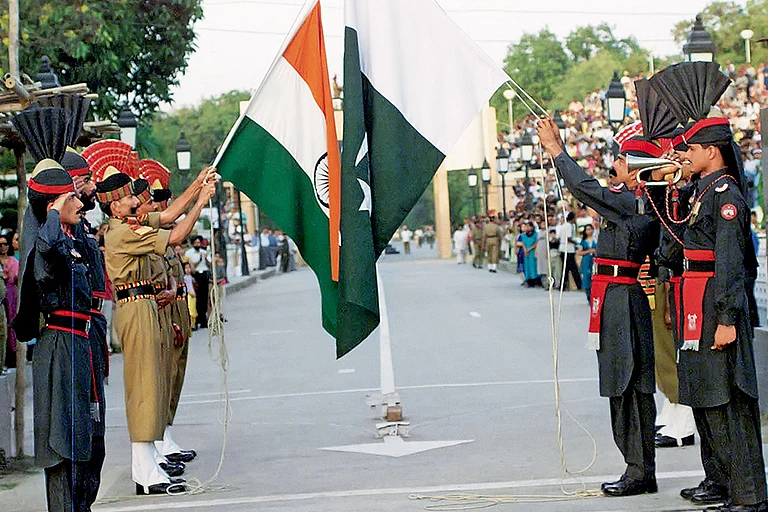The suspension of the Indus Water Treaty (IWT), despite the recent ceasefire between India and Pakistan, marks a pivotal moment in not only cross-border water diplomacy but also in transboundary river water sharing norms. India rebuts any further talks on resuming the treaty till cross-border terrorism is irrevocably stopped. Amongst about 153 countries, India is one of the 43 countries that has effective operational arrangements on river water sharing.
A Pivotal Moment In Water Sharing Norms
The Indus Water Treaty has stood the test of time since it was enacted. Its suspension sets a worrying precedent in cross-border hydro diplomacy
The Indus Water Treaty has withstood the test of time since it was enacted in 1960, and was not even affected by two major wars in 1965 and 1971 between upper riparian India and lower riparian Pakistan. The three eastern rivers (Ravi, Beas and Sutlej) to India and the three western rivers (Indus, Jhelum and Chenab) to Pakistan have worked as a unique rivers' sharing arrangement of its kind in the world. This arrangement has proved vital for pursuing agriculture in Pakistan, which relies heavily on these waters. But the suspension of the treaty, following the unprovoked massacre of tourists in Pahalgam, Kashmir, has set a concerning precedent on the use of water as a geopolitical weapon. Such actions underscore the potential for water to be weaponised, exacerbating tensions and humanitarian risks.
The four-day war between India and Pakistan came to an end with a ceasefire, which seems to have been brokered by US President Donald Trump, but the internal security issues have remained unaddressed, leaving India to use its upstream stature strategically on order to address its security concerns. It is not just a bilateral flashpoint but a global warning that could replace cooperative hydro-diplomacy with coercive hydro-hegemony. The possibility of upper riparian countries using water as a decisive weapon to trigger scarcity that may eventually lead to war was postulated by Ismail Serageldin in 1995, the then Vice President of the World Bank, who had stated that the wars of the 21st century would be triggered by water, to be called Water Wars.This meant that upstream countries may use water as a weapon to trigger scarcity that may eventually lead to war.
However, the Indus Water Treaty was not affected by the two major wars between the warring neighbours. But the prediction has been repeated innumerable times in the media. Not only has the Water Wars literature evolved with time, but numerous transboundary agreements between riparian countries have been drawn to deflect such an ominous possibility. Curiously, the literature continues to weigh water as a natural 'resource', and not as a political 'weapon' and is relevant across some 310 transboundary river basins shared between countries across the world. Given its increasing demand, water remains a politically contested issue in much of South Asia.
India's internal security concerns seem fully justified but should strategic control over water sources be leveraged for political gains, which are often at the expense of vulnerable populations? In this regard, large-scale engineering projects prove counterproductive as these not only disenfranchise communities but also escalate social disputes. Dr Malin Falkenmark of the Stockholm Water Institute (SIWI), who had developed the Water Stress Indicator, noted that the lives of people having access to 1000 m3 to 500 m3 of water per year remain chronically vulnerable. Tragically, the vulnerable communities in the region across the border at the lower end of the river have little or no control over geopolitical decisions, which leaves them helpess.
Further, changing climatic scenarios in the region is adversely impacting the hydrology of river flows. Any short-term or long-attempt to divert natural flows have irreversible impacts. Since India and Pakistan are among the world's top groundwater consumers, curtailing river flow can further stress the basin hydrology as the region's aquifers are among the most overstressed globally, lacking sufficient replenishment to meet demand.
Acknowledging the uncertain climatic conditions, India and Pakistan have a chance to take the lead by reviving the treaty with updated safeguards. Maintaining a minimum environmental flow of 15-20 per cent of the average lean season flow in the rivers is critical for their health. Such National Green Tribunal (NGT) decisions must apply to all rivers, at least in this part of the world.The Indus after all is not just a river--it is the root of a shared civilisation. The very name 'India' is derived from it. Should the present geopolitics be allowed to erode the rich ecological and cultural heritage? Both countries should rethink the urgent need for resilient and cooperative water governance. The reinstated treaty must ensure upstream-downstream river hydro-solidarity.
Kavita Sachwani is a Mumbai-based Sustainable Finance and Water Professional
Sudhirendar Sharma is a Delhi-based Independent Researcher and Academic

